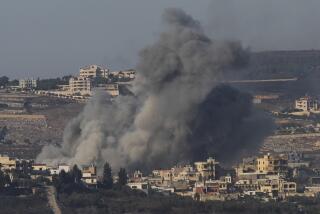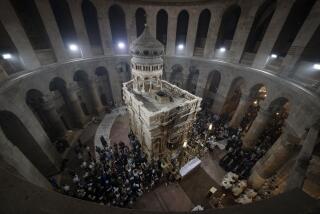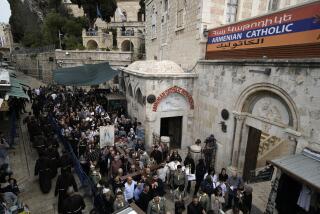Israeli Troops Bar 3 Christian Clergymen From Town : West Bank: Roman Catholic, Greek Orthodox and Armenian bishops decry military blockade outside Beit Sahur, site of a prolonged tax revolt.
BEIT SAHUR, Israeli-Occupied West Bank — Soldiers barred the leaders of three Christian churches from delivering food Friday to Beit Sahur, a town besieged by soldiers under orders to break a tax revolt against Israel’s occupation of the West Bank and Gaza Strip.
Bishops of the Roman Catholic, Greek Orthodox and Armenian churches of Jerusalem were stopped at a military roadblock outside Beit Sahur, a largely Christian town of 12,000 people at the edge of Bethlehem. With the bishops were three trucks carrying rice, flour and cooking oil.
“What’s going on in Beit Sahur is unjust,” said Michel Sabah, the Roman Catholic archbishop of Jerusalem. “It is not acceptable to any churchman or any spiritual man who has a human conscience. Our visit was an act of pastoral duty to our people, who expect to hear a word of comfort.”
A soldier at the roadblock said the town had been declared a “closed military zone.” He said the bishops were kept out for their own safety.
Later, the churchmen rejected as “insulting” an offer by military officials to let them visit Beit Sahur churches in a single car with an armed escort.
The entrances to the town are blocked by Israeli soldiers, who prevent outsiders from entering. The soldiers also confiscate household items, commercial goods, cars and machinery from the townspeople in lieu of taxes.
After being turned away, the bishops retired to the Church of the Nativity in Bethlehem, which is believed by Christians to be the site of Jesus’ birth. There they offered a brief prayer service.
In Beit Sahur, soldiers armed with rifles stood guard at the Roman Catholic and Greek Orthodox churches. At the Greek Orthodox Church of the Forefathers, a small group of people waited in vain for their bishop’s arrival.
“We wanted to tell him our troubles,” a woman named Rima said. “The soldiers took my television, my refrigerator, my furniture. They are taking everything.”
The tax raids began in mid-September, four months after the townspeople decided to stop paying taxes as a means of protesting the occupation. In the past week, troops have started arresting people who refuse to pay. Defense Minister Yitzhak Rabin vowed to break the revolt, which is the most significant effort at passive resistance of the Palestinian uprising, now almost two years old.
The tax revolt has also drawn the attention of Pope John Paul II, who spoke out last Sunday in support of Palestinian demands for a homeland.
“I wish to make my own the legitimate request of the Palestinian people to live in peace in their own country,” he said.
The 1.7 million people of the West Bank and Gaza Strip are for the most part Muslims. There are Christian enclaves in Bethlehem, Beit Jala, Beit Sahur, Al Birah and a few other small towns and villages in the West Bank.
In response to the Pope’s remarks, Ehud Olmert, an Israeli Cabinet minister without portfolio and a close associate of Prime Minister Yitzhak Shamir, said that the Pope had shown “selective sympathy” for the Palestinians while acting with “indifference” toward Jews.
Soldiers impose a dusk-to-dawn curfew on Beit Sahur, and many of them spend the night on rooftops watching for movement in the streets. Telephone service has been cut off. Soldiers have intercepted deliveries of vegetables and milk from private purveyors. Deliveries of cooking gas are barred, though flour is still permitted to come in.
In anticipation of food shortages, residents have stocked up on dried and pickled foods.
The military has banned not only the general public from entering but also foreign diplomats, members of Parliament and the press.
On Friday, two reporters were detained for an hour at police headquarters in Bethlehem after visiting Beit Sahur. They were told they would risk arrest if they returned.
More to Read
Sign up for Essential California
The most important California stories and recommendations in your inbox every morning.
You may occasionally receive promotional content from the Los Angeles Times.










